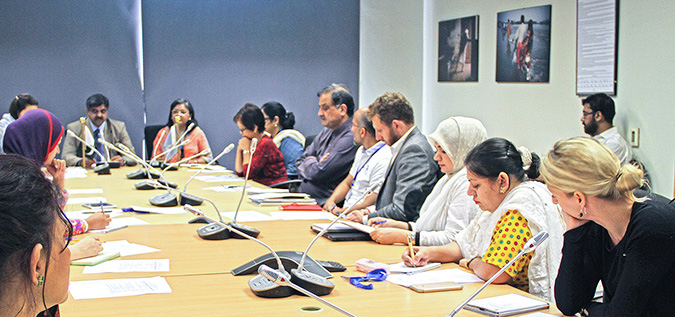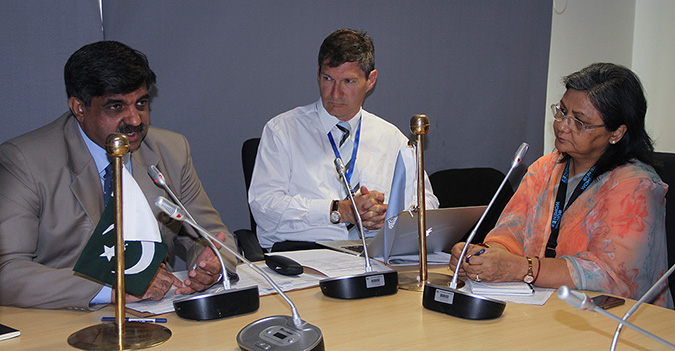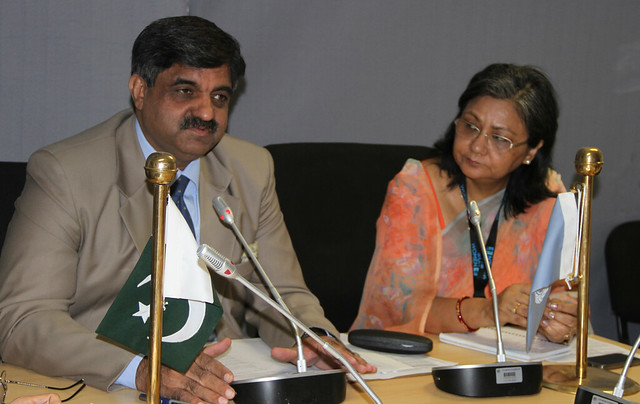Debrief by Pakistan’s Delegation to the first-ever World Humanitarian Summit
Date:
Author: Faria Salman
Islamabad, Pakistan – The first-ever World Humanitarian Summit (WHS) was convened by the United Nations (UN) in Istanbul on 23-24 May 2016, where Member States gathered to support efforts to better assist some 100 million people in need each year.

With over 60 million displaced people in the world compared to 37 million a decade ago, demands on the humanitarian system are growing every year. With more than 1,000 commitments, significant progress was made in placing women and girls at the heart of the discourse on strengthening humanitarian response. This was one of the recommendations put forward by the Pakistan delegation led by Lieutenant General (R) Abdul Qadir Baloch, Minister for States and Frontiers Regions (SAFRON), and representatives from the National Disaster Management Authority (NDMA), Civil Society and UN.

In capitalizing on the achievements of the WHS and localizing efforts in Pakistan to make a difference to the lives of the women and girls in these difficult circumstances, a de-brief session was hosted by the National Gender Humanitarian Task Force jointly co-chaired by UN Women and the Gender and Child Cell of NDMA (NDMA-GCC) along with Care International and the United Nations Population Fund (UNFPA) in Islamabad on 21 June 2016.
Speaking during the de-brief Aqsa Khan, Senior Gender Advisor, CARE International Pakistan, presented the WHS commitments to deliver on for women and girls which include support for women’s participation as agents of change, their access to sexual and reproductive health care, and prevention and response to violence against women and girls.
Representing civil society organizations, Mariam Bibi reflected that: “Whilst it was generally felt that the humanitarian crisis will globally increase, WHS saw the highest level of interactions to localize gender commitments. Pakistan must take these to the village level by expanding the base of actors who can extend grass-root support. Accountability of communities to prepare and respond to disasters should also be enhanced.”
“Women must be included in disaster preparedness and building back better - women should be supported to be able to articulate and express themselves in dialogue and actions,” she added.
Naseer Memon, Chairperson of Pakistan National Humanitarian Network stated that: “WHS is a new beginning that brought world leaders together to think, discuss and commit for a change, and in conjunction with the Sustainable Development Goals (SDGs), Paris Agreement and Sendai Framework can pave the way for a human society with greater resilience.”
He added that “Pakistan can offer its experience sharing of handling complex emergencies such as working amid higher vulnerability to disasters, violent conflicts, security challenges, poverty and geo-strategic challenges that call for greater collaboration of all stakeholders.” Mr. Memon suggested that in localizing recommendations from the WHS, “Pakistan can develop a national agenda for change based on SDGs, Paris Agreement and Sendai Framework plus the National Disaster Management Plan (NDMP). A more enabling environment, without compromising on accountability, is needed where all stakeholders can pool their abilities and resources under the umbrella of NDMA.” He also called for all stakeholders to support NDMA’s NDMP with advocacy and resource mobilization.
Major General Asghar Nawaz, Chairman of NDMA and Member of the Pakistan Delegation said: “For each of the seven WHS core commitments of which five relate to women and girls, Pakistan offers its full commitment to catalyze and localize gender inclusive actions. For Pakistan the humanitarian challenges from natural disasters and our categorization as a high-risk country under climate change, are huge.” General Asghar highlighted Pakistan’s response to humanitarian challenges faced by women since establishment of the NDMA-Gender and Child Cell (GCC) in 2010 with technical support from UN Women – development of a GCC Framework and a Vulnerable Groups Policy, guidelines and standards for gender based violence are being developed, establishment of a population disaggregated database (on socio-economic, gender, children and disability) and media orientation on gender sensitive reporting during humanitarian crises. “Whilst ‘developed’ countries have data enable environments, high literacy levels, implementation of laws and strong social structures, Pakistan lacks these.
"However, people are becoming more aware of how to plan for and respond to disaster and humanitarian situations,” he added. Major General Asghar concluded with the Government’s ownership to respond to disasters by changing mindsets through legislation and policies, and creating synergy and building capacity through better management and focus.In his de-brief, Neil Buhne, UN Resident Coordinator and Humanitarian Coordinator for Pakistan shared that more commitments were made than ever before and lauded NDMA’s commitment considering: “Pakistan itself has a fair amount happening at the moment.” Mr. Buhne stressed that: “both humanitarian response and disaster risk reduction need the gender element and for systems to be more progressive with local level engagement.”
In concluding the de-brief session, Dr. Alexandra de Sousa, Deputy Head, UN Office for the Coordination of Humanitarian Affairs, OCHA said: “One recommendation from the Pakistan’s commitments that has stood out is support to local women groups as contributors to disaster risk reduction, resilience, preparedness and response.” In taking full advantage and follow-up on this substantial commitment, she recommended that as a first step, gaps be identified and strategies developed to address the gaps along with responsible actions, and offered OCHA’s support in this regard.
In her closing remarks Sangeeta Thapa, Deputy Representative, UN Women said: “It is our responsibility to operationalize the recommendations with a gender dimension - women affected by disasters and crises must be high on our agenda.”
Photo Gallery
For more information:
Please contact: Faria Salman
Strategic Management and Partnerships Officer &
Communications Focal Point for UN Women Pakistan
Email: [ Click to reveal ]
